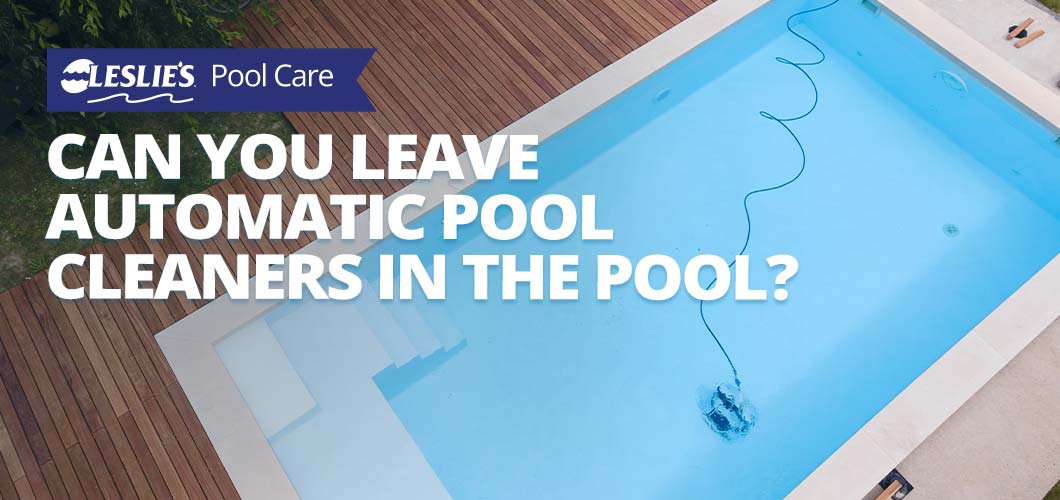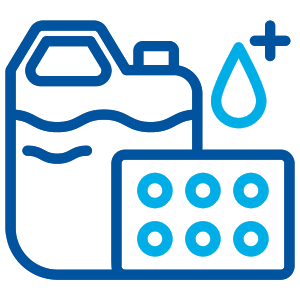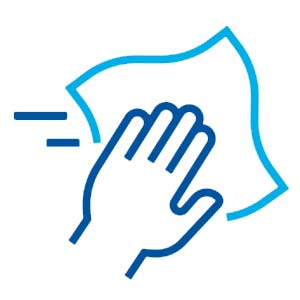
Can You Leave Automatic Pool Cleaners in the Pool?
Automatic pool cleaners are known for their efficient, hands-free cleaning capabilities, and adding one to your pool equipment repertoire is a rewarding investment. Many cleaners come with a steep price tag, so taking good care of them is important. However, it’s common for many pool owners to leave their cleaner in the pool for long periods. But should you leave automatic pool cleaners in the pool?
In this post, we will discuss the reasons why it's in your best interest to remove your automatic pool cleaner from your pool when it's not in use.
Why You Should Take Your Automatic Pool Cleaner out of the Pool
Automatic pool cleaners — whether pressure side, suction side, or robotic — are designed to stay in water and handle the wear and tear of routine use. So leaving one in the pool for a while can't be bad, right?! Well, just because you can leave them in the pool doesn't mean you should. There are several potential problems that can occur if you’re in the habit of leaving your automatic pool cleaner in the pool for prolonged periods.
1. Chemical Exposure

The longer your automatic pool cleaner sits in your pool, the longer it's exposed to chemicals. Even if your pool water chemistry is perfectly monitored and balanced, certain chemicals can be detrimental to your cleaner. Chlorine can be particularly harmful to your cleaner because of its corrosive nature. The standard, daily dose of chlorine can slowly eat away at the cleaner's wheels, plastic shell, and metal parts over time. And if the relatively low, everyday amount of chlorine can wear down your cleaner, imagine what a few rounds of pool shock would do!
Chlorine is not the only element in your pool water that can damage a pool cleaner. Unbalanced pH and Total Alkalinity (TA) can also wreak havoc on your automatic pool cleaner. An elevated pH can cause scaling in your pool and on any equipment in your pool, and a low pH can be corrosive, which may damage certain pool cleaner parts. Cleaner wheels, onboard filters, and other pieces of your automatic pool cleaner risk damages from unbalanced water.
First and foremost, before putting an automatic pool cleaner into your pool, test and balance pool water chemistry. Properly balanced pool water will drastically reduce the likelihood of your cleaner experiencing chemical damage during routine daily use. Then, after each cleaning cycle, take the cleaner out of your pool and rinse it off with fresh water. Never leave your cleaner in the pool while adding chemicals to the water, as high chemical concentrations can harm the cleaner. Allow the water plenty of time to circulate, and recheck the water balance before returning it to the pool for another cleaning cycle.

2. Danger to Swimmers
Maintaining a safe pool isn't just about clean and sanitized water. It's also about keeping your pool free of dangerous obstructions. Suction side cleaners, pressure side cleaners, and robotic cleaners pose a threat to swimmers because of their long hose or cord attachments. Leaving one of these cleaners in the pool while swimmers are present can pose a serious threat of entanglement. Certain cleaners also pose a risk of suction entrapment because of their high suction power.
No matter the situation, it's not worth the risk. ALWAYS take your automatic pool cleaner and cleaning attachments out of the water before allowing swimmers in the pool.
3. Damage from Overdue Maintenance

Automatic pool cleaners are popular because of their "set it and forget it" convenience. For many brands and models, all you need to do is simply plug the hose or power cord in, program a cleaning cycle, and they're ready to go. A few models, like the Dolphin Proteus DX5i robotic cleaner, can be programmed from an app on your smartphone! But this hands-off functionality is also what makes it easy to postpone, or even forget, routine cleanings and maintenance checks.
Taking your automatic pool cleaner out of the water after each cleaning cycle gives you the opportunity to clean out the filter or bag, and inspect it for any damages. A clogged filter canister or full debris bag will force your cleaner to work in overdrive. This can potentially burn out key mechanisms on your pool cleaner. Additionally, a damaged vacuum feature or wheel will limit the cleaner's abilities, which can also cause a mechanical burnout. If you have a suction cleaner that relies on your pool filter for removing debris, remember to regularly clean out the pump strainer and skimmer basket(s), and keep the filter clean to reduce wear and tear on your pool pump.

4. Loss of the Manufacturer Warranty
Most people probably don't read through the entire owner's manual for their automatic pool cleaner. It's a bit dry, we get it! But, there is one part you should pay close attention to — the limited warranty section. Zodiac, Polaris, and Hayward, just to name a few, all state their automatic pool cleaner warranty will be voided if the cleaner is damaged due to water chemical imbalance or lack of product maintenance.
Automatic pool cleaners can be costly to repair, so don't risk losing warranty coverage by not maintaining and storing your cleaner correctly.
5. Exposure to the Elements

Too much sun exposure is bad for just about everything. Even flowers, which get their life source from the sun, will dry out and wilt after too much time in the sunlight. The same goes for your automatic pool cleaner. Leaving it submerged in pool water chemicals is bad enough. But excessive time in the sun can fade your cleaner, and can dry out and crack rubber and plastic parts more quickly.
Rainstorms and strong winds can also damage your automatic pool cleaner. Large amounts of rain in your pool will throw the water chemistry off balance, putting your cleaner at risk for chemical damage. Strong winds can cause tree branches, garbage, and even patio furniture to fall into your pool and land on your pool cleaner, and excessive debris may clog up the cleaning mechanism.
If you live in a particularly sunny area, or if a storm is on the horizon, take your cleaner out of the pool and store it until it's safe to use again.
How to Care For and Store Your Automatic Pool Cleaner

Now that you know the problems that can come from leaving your automatic pool cleaner in your pool, let's discuss the best ways to care for and store it.
As mentioned above, the best thing you can do for your cleaner is take it out of the water, empty the filter canister or debris bag (if applicable), and rinse it off after each cleaning cycle. Doing so will not only prolong the life of your cleaner, but also eliminate the potential danger of swimmers getting wrapped up in the cleaner's hoses or cords.
After removing your cleaner from the pool and rinsing it off, store it out of direct sunlight and away from pesky critters. A few cleaner models, like the Polaris VRXiQ+ robotic cleaner, come equipped with a rolling caddy for easy transport. When storing your cleaner, coil the hose or power cord loosely to avoid tangles and kinks. A large deck box, like this one, will not only keep your pool cleaner shaded and dry, but it's also a stylish accent piece for your patio.
Remember, just because you can leave your automatic cleaner in the pool doesn't mean you should. While it may take months, or even years, for pool water to damage your pool cleaner, why risk it? Automatic pool cleaners, such as robotic pool cleaners, usually come with a large price tag, so it's in your best interest to take proper care of it. For more info on automatic pool cleaner care, stop by your local Leslie's — we offer free in-store pool cleaner inspections, as well as free labor* on cleaner repairs.
*In the event that your pool cleaner requires a tune-up or repair, the only thing you'll pay for is the part(s) to fix it. We'll handle all the rest.